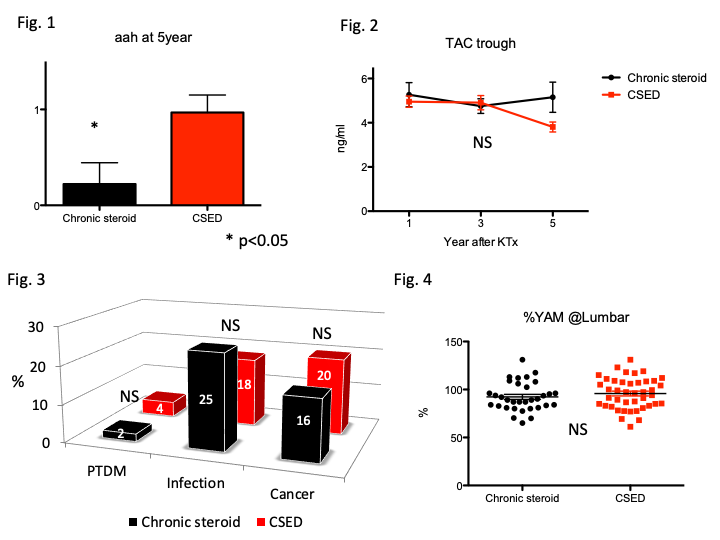Long-Term Low-Dose Corticosteroid Therapy Can Suppress Calcineurin Inhibitor Induced Nephrotoxicity without Steroid-Related Complication in Living Kidney Transplant Recipient
Sapporo City General Hospital, Sapporo, Japan
Meeting: 2022 American Transplant Congress
Abstract number: 1375
Keywords: Calcineurin, Induction therapy, Kidney transplantation, Nephrotoxicity
Topic: Clinical Science » Kidney » 37 - Kidney Immunosuppression: Induction Therapy
Session Information
Session Name: Kidney Immunosuppression: Induction Therapy
Session Type: Poster Abstract
Date: Monday, June 6, 2022
Session Time: 7:00pm-8:00pm
 Presentation Time: 7:00pm-8:00pm
Presentation Time: 7:00pm-8:00pm
Location: Hynes Halls C & D
*Purpose: The induction of calcineurin inhibitors (CNI) greatly reduced the rate of allograft rejection, although their chronic use resulted in vascular inflammation in kidney transplant recipients. We evaluated whether corticosteroid therapy as anti-inflammatory agent may prevent CNI nephrotoxicity.
*Methods: 91 patients who underwent ABO compatible kidney transplant (KT) from living-related donors in our hospital were enrolled. Among 91, 43 recipients received daily low-dose methylprednisolone in addition to tacrolimus (TAC) and mycophenolate mofetil (MMF) (Chronic steroid group). Historical control group was composed of 48 recipients who were treated with TAC, MMF and only 3-days of perioperative methylprednisolone (Corticosteroid early discontinuation: CSED group). Basiliximab was also used as induction mAb in each group. Patient and graft survival, the incidence of acute and chronic rejection, Banff aah-score indicating CNI nephrotoxicity,steroid-related adverse effects were analyzed retrospectively.
*Results: There were no statistical differences in age at transplant, sex, donor age, HLA- mismatch and duration of renal replacement therapy between the two groups, but observed period was significantly longer in chronic steroid group. (14y vs 10y, p<0.001) Patient and graft survival were comparable at 10 years after KT between Chronic steroid and CSED group. (97% vs 89% p=0.09, 91% vs 85% p=0.74, respectively) Incidence of acute and chronic rejection was also similar. In pathological study, however, aah-score was markedly decreased in chronic steroid at 5 year after KT compared to CSED group (0.22 vs 0.97, p=0.04) (Fig. 1) despite of no difference in TAC-trough during 5 years (Fig.2), suggesting that chronic steroid may suppress CNI nephrotoxicity. On the other hand, the incidence of de novo DM, infection and cancer was equivalent as well as lumbar bone density which was shown by % young adult mean. (Fig. 3 and 4)
*Conclusions: Long-term low-dose corticosteroid therapyhas achieved promising graft outcome with suppressing CNI nephrotoxicityin addition to steroid associated complication.
To cite this abstract in AMA style:
Sasaki H, Harada H, Takamoto D, Takada Y, Harada S, Tanaka H. Long-Term Low-Dose Corticosteroid Therapy Can Suppress Calcineurin Inhibitor Induced Nephrotoxicity without Steroid-Related Complication in Living Kidney Transplant Recipient [abstract]. Am J Transplant. 2022; 22 (suppl 3). https://atcmeetingabstracts.com/abstract/long-term-low-dose-corticosteroid-therapy-can-suppress-calcineurin-inhibitor-induced-nephrotoxicity-without-steroid-related-complication-in-living-kidney-transplant-recipient/. Accessed February 17, 2026.« Back to 2022 American Transplant Congress

